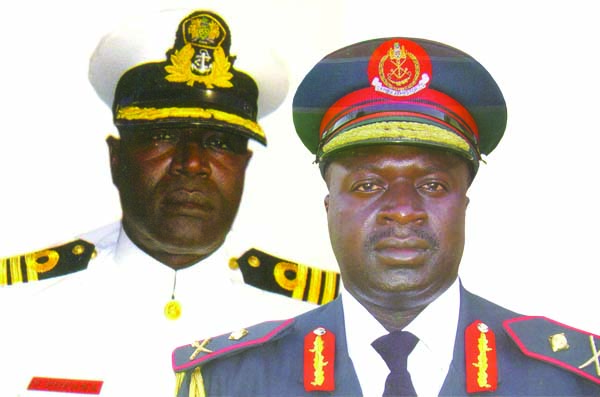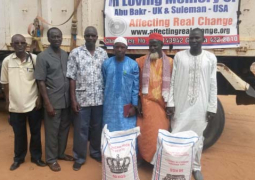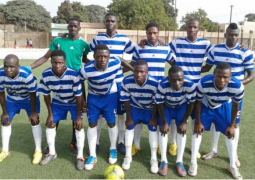
Drama unfolded yesterday at the special criminal court in Banjul, when the state witness, Captain Yahya Darboe, refused to give evidence in the treason trial of Lt. General Lang Tombong Tamba, former chief of defence staff and chief of naval staff Rear Admiral Sarjo Fofana.
Captain Darboe is a convict serving life imprisonment after being convicted by the general court martial for his involvement in the 2006 abortive coup attempt.
He was labelled a “hostile witness” by court, when he refused to testify for the prosecution.
Darboe refused to swear to the holy Qur’an. “Swear for what? What am I going to do here? Why am I swearing? I don’t know!” he told the court.
He adduced that he is a convict at the State Central Prison Mile 2, and that no one told him anything.
The presiding judge, Justice Ikpala, said the witness must either swear or be on oath in order to give evidence in court, but Darboe insisted that he will not swear to the Qur’an nor take an oath.
This prompted the prosecutor who is the director of special litigation (DSL), Daniel O Kulo, to cite section 164/165 of the Evidence Act, and to urge the court to make the witness give evidence.
He also cited section 161 sub section (1 ) of the Evidence Act, adding that if the witness fails to give evidence, the court has the power to compel him to do so.
When the witness insisted that he would not give evidence, DO Kulo then cited section 209 and 210 for the witness to be treated as hostile witness, and urged the court to proceed with the case and treat the witness as a hostile witness.
However, defence counsel L.K. Mboge in response told the court that section 209 was not applicable in this case.
Mboge further submitted that before you can treat a witness as hostile, he must have been sworn, or given an oral testimony in the case which is inconsistent with his present testimony.
“My lord, I submit that the witness cannot be treated as a hostile witness, because he has not given evidence that contradicts his earlier statement,” Mboge told the court.
SM Tambedou, another defence counsel, also told the court that for the witness to be treated as a hostile witness, he must first give evidence, and cannot be treated as hostile witness without first giving evidence.
DSL Daniel O Kulo again submitted that section 209 of the Evidence Act was applicable in the circumstances.
Justice Ikapala subsequently ruled that the witness could be treated as a hostile witness, because he refused to give evidence.
Meanwhile, Darboe told the court: “My lord, the whole thing is confusing here. It was about seven to eight months ago when I was invited to the National Intelligence Agency (NIA), where I was told that they were instructed to investigate about an attempted coup plot for 2006. I gave them my honest opinion, when I narrated the whole story.”
He said that, at the NIA, he was put in a special area for that explanation, adding that from there he was asked to sign, which he said he complied with, and signed.
Darboe further told the court that a lot of things were said to him, during the time he was called to the agency.
He said this included a promise that he would be free to go home from the prison, and he might be reinstated in the armed forces, with back pay for the number of years he had spent in prison.
Never asked to witness
Darboe further told the court that he was never approached to act as a prosecution witness in any case in The Gambia.
At that stage, DO Kulo showed the witness a statement, which Darboe recognised as his, and the prosecution applied to tender it as a court exhibit, without any objection from the court.
DO Kulo then proceeded to ask the witness whether he was annoyed with the state over the promise to be reinstated in the army, but Darboe insisted that he had not held any discussion with the state for his reinstatement in the armed forces.
He told the court that he was promised at the NIA that they will pay his arrears.
Darboe identified Sarjo Fofana in court when state counsel asked him whether he recognised the accused persons.
However, Darboe said he did not know whether there was an attempted coup on 21st March 2006 in The Gambia.
He also denied any ample knowledge about the 2006 alleged coup plot, in response to a question by the prosecutor.
“I was represented by a counsel in that trial and my counsel said I should not mention names, as it will complicate the matter,” Darboe adduced.
Under cross-examination by defence counsel L.K Mboge, Darboe told the court that he hails from Badibou Salikenni in the North Bank Region.
`Counsel Mboge asked him whether he knows what it means to be a freeman, and Darboe said, “I know 100 percent what a freeman is”.
“That means you speak the truth without fear or favour,” counsel continued, but the state prosecutor objected but was overruled by the trial judge. The witness subsequently answered, “Yes.”
Darboe also said, under cross-examination, that he had no knowledge that he would be coming to court on Tuesday, when counsel Mboge asked him whether he had fore knowledge of coming to court.
At that juncture the case was adjourned till 6th December 2010 for continuation.
It would be recalled that Lang Tombong Tamba and Sarjo Fofana are on trial in connection with the 21st March 2006 aborted coup attempt, allegedly spearheaded by former CDS Col. Ndure Cham.
Read Other Articles In Article (Archive)

Affecting Real Change distributes 405 bags of rice to needy Gambians
Jul 4, 2016, 9:50 AM
Penyem snatch 1st win in Inter-community Association Tourney
Jan 12, 2012, 1:53 PM


